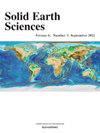藏北羌塘中部陶兴湖地区的晚奥陶世闪长岩及其构造意义
IF 2
4区 地球科学
Q3 GEOSCIENCES, MULTIDISCIPLINARY
引用次数: 0
摘要
青藏高原早古生代的构造演化尚未完全清楚。青藏高原北部羌塘断块内的龙木-双湖断裂带,记录了青藏高原早古生代演化历史的重要证据。本研究利用锆石U-Pb定年、矿物化学、全岩地球化学和锆石Hf-O同位素等手段,对羌塘中部陶兴湖地区出露的早古生代闪长岩进行了研究。目的是查明原岩的特征和变质过程。在闪长岩中发现了两种具有不同特征的锆石,利用核密度估计法得出的锆石U-Pb年龄分别为490 Ma和440 Ma,分别代表了原岩和随后的变质过程的年龄。闪长岩的二氧化硅(42.4-55.7 wt.%)、氧化铝(14.4-18.7 wt.%)和氧化镁(3.62-8.80 wt.%)含量较高。其地球化学特征表现为大离子亲岩元素富集和高场强元素贫化。锆石U-Pb年龄和岩石地球化学数据表明,闪长岩的原岩是晚寒武纪超俯冲带型蛇绿岩,与原泰西俯冲带相关联。随后的晚奥陶世变质事件可能与大洋关闭后大陆块之间的碰撞有关。我们认为,闪长岩为青藏高原早期古生代构造演化史提供了重要的约束条件。本文章由计算机程序翻译,如有差异,请以英文原文为准。
Late Ordovician amphibolites in the Taoxinghu area of central Qiangtang, northern Tibet, and their tectonic significance
The early Paleozoic tectonic evolution of the Qinghai-Tibetan Plateau remains not fully understood. The Longmu Co-Shuanghu Suture Zone within the Qiangtang block of northern Qinghai-Tibetan Plateau, records important evidence of the early Paleozoic evolutionary history of the plateau. In this study, we investigated early Paleozoic amphibolites exposed in the Taoxinghu area of central Qiangtang, using zircon U–Pb dating, mineral chemistry, whole-rock geochemistry, and zircon Hf–O isotopes. The objective was to identify the characteristics of the protoliths and the metamorphic processes. Two types of zircons with different characteristics occur in the amphibolites, yielding zircon U–Pb ages of 490 and 440 Ma attained using kernel density estimation, which represent the ages of the protolith and subsequent metamorphism, respectively. The amphibolites have SiO2 (42.4–55.7 wt.%), and Al2O3 (14.4–18.7 wt.%) and MgO (3.62–8.80 wt.%) contents. Their geochemical characteristics show large ion lithophile elements enriched and high field strength elements depleted. The zircon U–Pb age and rock geochemical data suggest the protoliths of the amphibolites were late Cambrian supra-subduction zone-type ophiolites that organized in association with Proto-Tethyan subduction. The subsequent Late Ordovician metamorphic event might be associated with the collision between continental blocks after oceanic closure. We favor that amphibolites provide essential constraints on the early Paleozoic tectonic evolutionary history of the Qinghai-Tibetan Plateau.
求助全文
通过发布文献求助,成功后即可免费获取论文全文。
去求助
来源期刊

Solid Earth Sciences
GEOSCIENCES, MULTIDISCIPLINARY-
CiteScore
3.60
自引率
5.00%
发文量
20
审稿时长
103 days
 求助内容:
求助内容: 应助结果提醒方式:
应助结果提醒方式:


